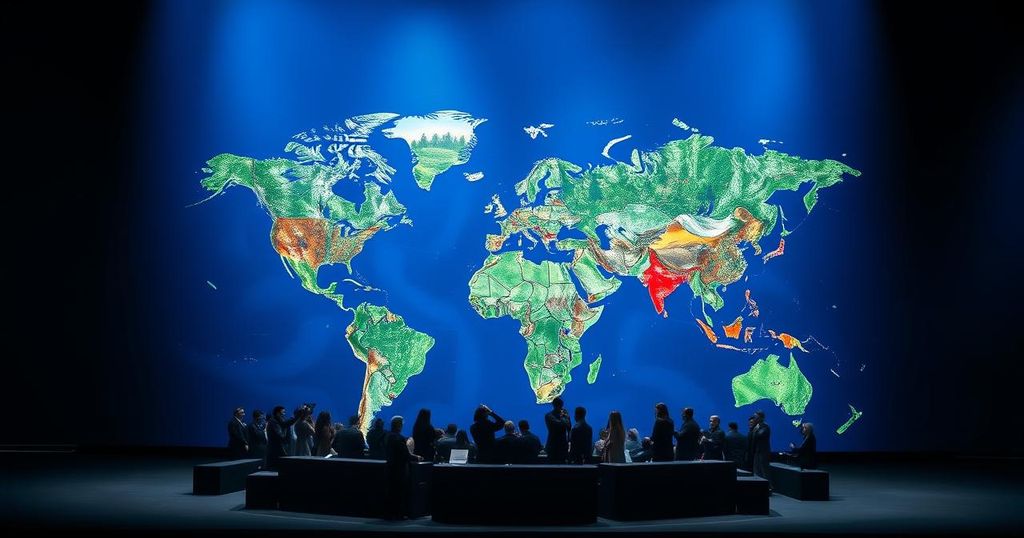Azerbaijan’s Hosting of COP29: A Conundrum of Climate Action and Human Rights Violations
The upcoming UN Climate Change Conference, COP29, is set to be hosted by Azerbaijan, a dictatorship led by President Ilham Aliyev, known for severe human rights abuses. The hosting decision has sparked concerns about the credibility of the UN’s climate initiatives, especially considering the rising number of political prisoners in Azerbaijan and the government’s repression of civil society. Critics argue for a reevaluation of host country criteria to prioritize democratic governance alongside climate commitments.
The hosting of the United Nations Climate Change Conference, COP29, by Azerbaijan, a regime characterized by repression and a poor human rights record, raises critical concerns. While the selection criteria for conference hosts by the UN encompass factors such as infrastructure and financial stability, they do not adequately consider democratic practices or human rights, leading to controversies surrounding the green credentials of the organization. Azerbaijan, ruled by President Ilham Aliyev, exemplifies this issue, as it is categorically classified as a dictatorship. The country has recently witnessed a surge in political repression, with significant numbers of political prisoners, now reaching at least 303, compared to 122 in December 2021. Incidents documenting government abuses include the unlawful detention of opposition figures and activists, who are often imprisoned under fabricated charges designed to silence dissenting voices. With upcoming finance goal discussions for addressing climate change, the continued support for a regime that engages in such practices highlights the incongruity of the conference’s intentions compared to the political realities of its host nation. Particular cases of activists such as Gubad Ibadoghlu and Anar Mammadli, both of whom face serious repercussions for advocating democracy and climate justice, underline the tension between hosting an international climate event and the sociopolitical environment in Azerbaijan. Allegations against them are typical of those faced by individuals opposing the regime, illustrating the government’s aim to suppress civil society. As the UN proceeds with COP29 under the auspices of a government with a disturbing human rights record, many question the legitimacy and intent behind such an occurrence. Given this context, possible reform of the selection process for hosting future climate conferences is warranted. Choosing a nation with strong democratic principles and a proven commitment to environmental issues could lead to more trustworthy and impactful global climate action.
The decision-making process for hosting international climate conferences is crucial to maintaining the integrity and credibility of the UN’s climate agenda. Traditionally, the criteria have largely emphasized logistical capabilities and financial resources, inadvertently allowing autocratic regimes to host these summits. This has raised significant concerns, as it risks endorsing governments with troubling human rights records, particularly in light of the pressing global climate crisis that requires comprehensive support and cooperation. Recent instances of human rights violations in Azerbaijan, where political suppression has increased dramatically, serve as a stern reminder of the potential ramifications of selecting nations without robust democratic accountability. The current political context preceding COP29 is marked by a crackdown on dissent, imprisonment of journalists, and severe restrictions on civil society, all of which illustrate the ethical dilemmas surrounding the event’s proceedings.
In conclusion, the forthcoming COP29 conference in Azerbaijan highlights the contradictions between the UN’s climate objectives and the stark realities of its host nation’s governance. The lack of emphasis on democratic values in the conference selection process necessitates a reevaluation of criteria to ensure that the prestige of such global gatherings does not inadvertently legitimize oppressive regimes. A more principled approach, favoring nations with strong commitments to both climate action and human rights, is imperative for fostering genuine progress in the global climate discourse.
Original Source: www.washingtonpost.com




Post Comment